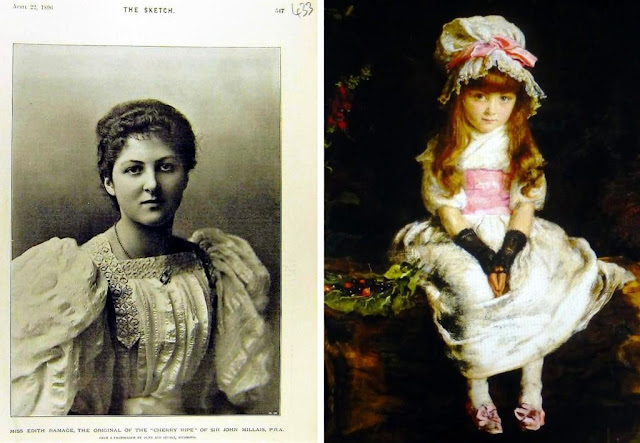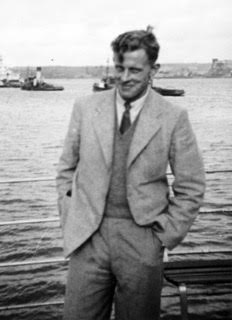Stories from Southlands Hotel, by Iris Ansell: 7.ii. Budleigh’s ‘Cherry Ripe’
Continued from
This is the final part of our story about the largely unknown second link between the celebrated Pre-Raphaelite artist and Budleigh Salterton.
That year, aged 22 and living in Richmond, Surrey, she married a Spaniard, Francisco de Paulo Ossorio Cembrano and gave birth to a daughter, Maria Edith. Thirteen years older than her, Francisco died in Italy in 1912, and Edith became a widow.
Wealthy
art collector Sir Joseph Robinson, who acquired ‘Cherry Ripe’ in 1898, and his London
home at 100 Park Lane. Image credit: Wikipedia. The house is still a private
home and today has an even wealthier owner according to an article in Vanity
Fair which you can read here
Around the turn of the 20th century, the painting ‘Cherry Ripe’ was sold to Sir Joseph Robinson (1840-1929), a wealthy South African diamond magnate who lived in London at Dudley House, Park Lane.
Robinson owned a magnificent collection of pictures including old masters by Piero di Cosimo, Giambattista Tiepolo, Murillo, Rubens and Van Dyck, and a virtually unrivalled collection of 18th-century portraits by Gainsborough, Reynolds, Lawrence, Beechey and Romney. The Robinson collection contained seven paintings by Millais, from the 1870s and 80s, including ‘Getting Better’, ‘Cinderella’ and ‘The Mistletoe Gatherer’.
The collection remained in storage for the greater part of the first half of the 20th century, until the summer of 1958 when it formed an exhibition at the Royal Academy.
On that occasion ‘Cherry Ripe’ was much admired and talked about. As an older generation re-kindled memories of its great fame in the last quarter of the 19th century, the younger generation apparently came to appreciate for themselves what was seen as the intrinsic beauty and individuality of Millais’ vision of childhood.
London’s Royal Academy, where the painting was
exhibited to great interest in 1958. Image credit: Mike Peel/Wikipedia
The 1958 Royal Academy exhibition sparked renewed interest in the painting, and it seems that large numbers of people approached the curators claiming that relations of theirs had served as the model.
A report in The Daily Telegraph of 9 August 1958 stated that the son of the real sitter had visited the Academy and had recognized the portrait of his mother in the exhibition.
Edith Ossorio by Muriel Wheeler Image credit: http://fannycornforth.blogspot.com
A few days later, on 13 August, the Telegraph reported that 'Signora de Paula Ossorio, who as a girl of four and a half was the model in 1879 for Millais’ ‘Cherry Ripe’, visited the Royal Academy yesterday as the guest of Sir Charles Wheeler, the president. She recalled the sittings and the chocolates which the painter used to give her.' The visit was seen as so special that Muriel Wheeler, Sir Charles’ wife, produced the above picture of Signora Ossorio.
Portrait of Humphrey Brooke CVO by Olwyn
Bowey RA (b. 1936). Image credit:
www.royalacademy.org.uk
Humphrey Brooke, Secretary of The Royal Academy, was, according to the Telegraph, so convinced that he issued a statement confirming that Mrs Francisco de Paula Ossorio had definitely been the sitter. However, the newspaper report continued, ‘from the correspondence received by the Royal Academy it is apparent that there have been, and still are, numerous other claimants!’
There are of course probably as many who claim that their ancestor was a model in ‘The Boyhood of Raleigh’.
View of Llandudno Image credit: Nigel Swales/Wikipedia
It seems that by the 1960s Edie Ramage was still widowed and retired to Llandudno, where she employed a companion called Mrs Fairley. She must have shared her memories of sitting for Millais with her companion, as Mrs Fairley set about finding the very same bonnet and matching slippers that had featured in the painting and gave them to Edie. In return, and as a mark of gratitude, Edie gave Mrs Fairley a 19th century French decanter casket made in Paris. It was later sold by auctioneers Rogers Jones of Colwyn Bay, North Wales.
Rock Mansions in Budleigh: the beachside front (left) and entrance on Fore Street
And this is one of the extraordinary parts of the ‘Cherry Ripe’ story. In later years Edie settled in Budleigh at Rock Mansions, just opposite The Octagon where Millais is said to have stayed while painting ‘The Boyhood of Raleigh.’ Fairlynch Museum co-founder Priscilla Hull remembered seeing her walking her labrador.
Had
she found Llandudno too busy and big? Had she remembered being on holiday in
Budleigh with her parents and nursemaid? Was there some truth after all in that
story that the Southlands Hotel guest told Iris?
Edith Ellen Ossorio is recorded as having died on 25 November 1970 at the grand age of 96. Did she share her memories of Millais and the ‘Cherry Ripe’ experience with anyone in Budleigh, I wonder.
Her widowed daughter Maria Edith may have been living with her in Rock Mansions. Maria had married a naval officer, Arthur Henry Seymour Casswell in London in 1921, but he had died in Worcester in 1940, having retired three years earlier in 1937. Fourteen years after Edie’s death, Maria Edith Casswell died in Bay Court Nursing Home on Budleigh’s West Hill on 7 August 1984.
The painting ‘Cherry Ripe’ finally came on the market in 2004 when it was auctioned by Sothebys as Lot 21, part of the collection of Sir Joseph Robinson. It made £1,125,600, having been estimated as likely to fetch between £800,000 and £1,200,000.
The grave of Edith
Ellen Ossorio in
St Peter’s Burial Ground, on Moor Lane, Budleigh Salterton
Edith Ossorio is buried in St Peter’s Burial Ground, in Block I, Row 7. I think that her grave could do with a bit of
tlc. Perhaps Budleigh art lovers may be inspired to look after it after seeing
this photo and reading her story.
Iris' final piece is 8. 'The Last Hotel Story' and can be read at https://budleighpastandpresent.blogspot.com/2021/04/stories-from-southlands-hotel-by-iris.html











Comments
Post a Comment